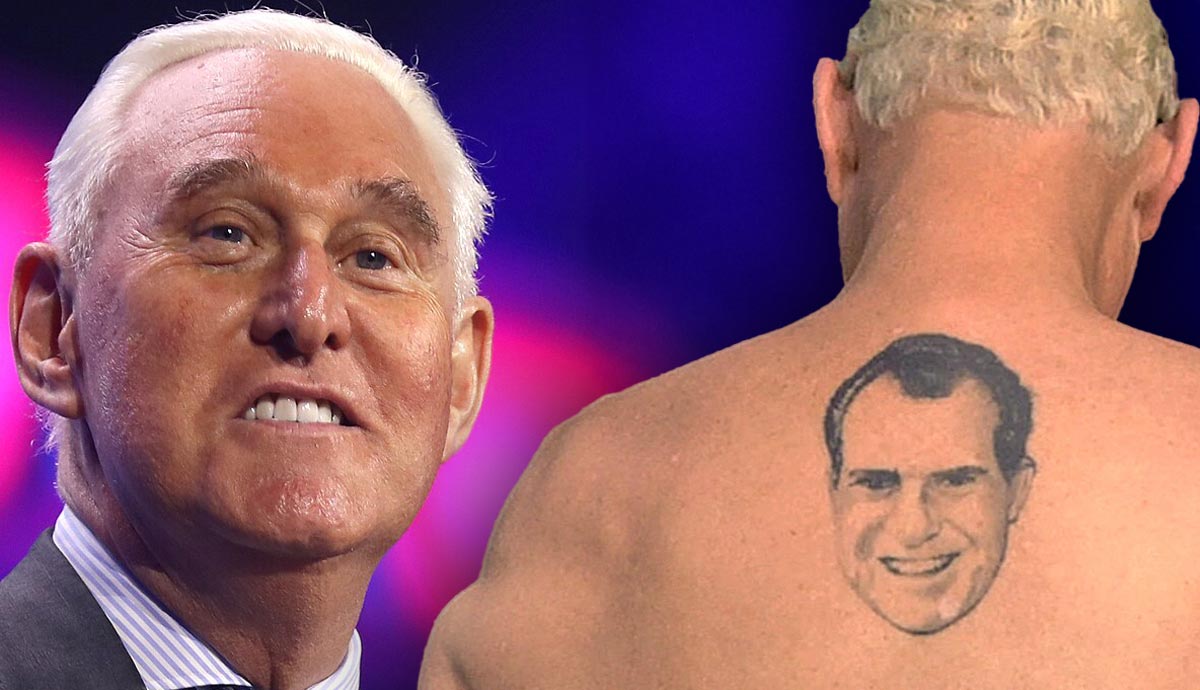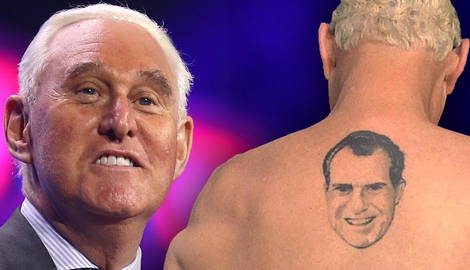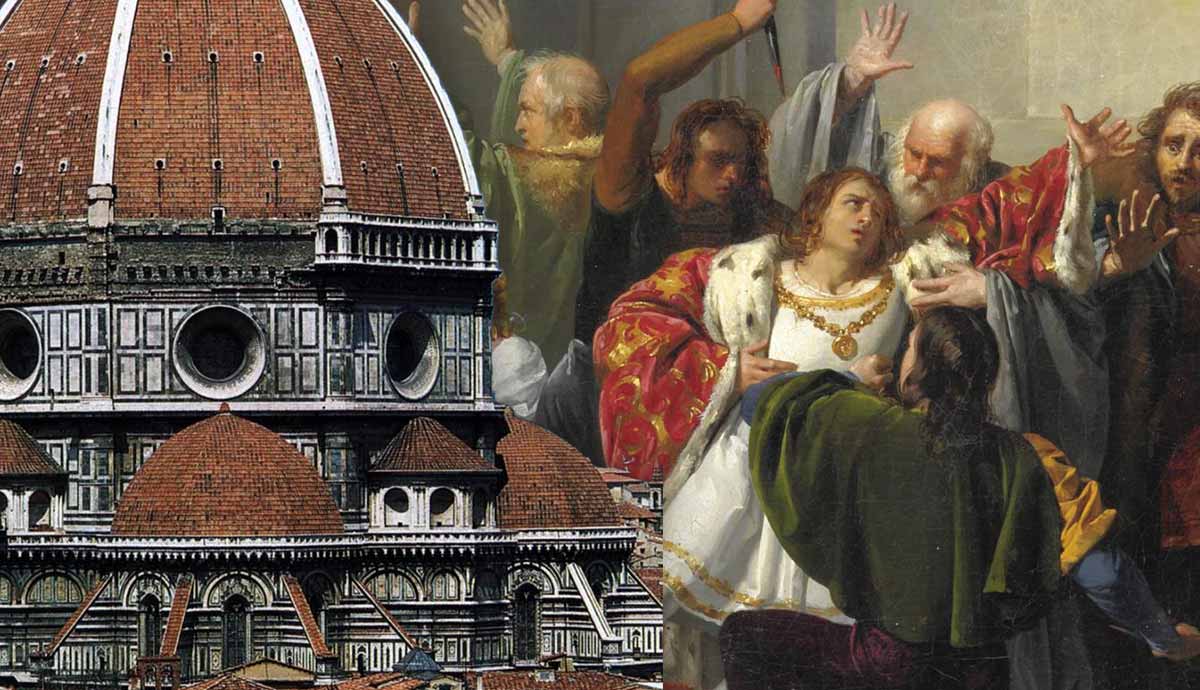
Self-described dirty trickster Roger J. Stone Jr emerged on the American political scene during the 1972 re-election campaign of President Richard Nixon – whose face is famously tattooed on his back. In more recent times, Stone has gained notoriety for his close relationship with Donald Trump. In 1998 he began working as a lobbyist for Trump’s casino business, served as an advisor on his 2000 presidential run, and later played a role in Trump’s 2015 campaign.
Over the years, Stone has become synonymous with Republican political strategy, from the Watergate scandal (1972) and Brookes Brothers Riot (2000), to the hacking of Democratic National Committee (DNC) emails (2016), and allegations of Russian interference in the 2016 U.S Presidential Election.
What Is Roger Stone’s Background?

Roger Stone was born in Norwalk Connecticut in 1952 and grew up in Lewisboro, New York. He attended John Jay High School in Westchester County, New York, and later studied at George Washington University. Even as a child, Stone exhibited a knack for playing tricks. At just eight years old, he claims to have told all the kids in his elementary school lunch line that Richard Nixon was in favor of school on Saturdays, hoping to sway opinion behind John F. Kennedy in the 1960 presidential election.
In high school, where he gained the nickname “Egghead” (due to the shape of his skull) Stone spent his time lifting weights, competing on the cheerleading team, and honing his political skill set. A campaign manager for his friend Rob Neukirch’s run for high school president, he set the tone for his later career by launching a whispering campaign that accused Neukirch’s rival of being a homosexual.
Was Watergate the Making of Roger Stone?

As a twenty-year-old college student, Stone volunteered for Richard Nixon’s 1972 re-election campaign, securing a role as a junior scheduler on Nixon’s Committee to Re-Elect the President (CREEP). Though his involvement in the Watergate Scandal was peripheral, he was connected with several figures in the Special Investigations Unit who broke into the Democratic National Committee headquarters. The politics of the era impacted him profoundly.
Stone deeply admired Nixon’s approach to politics. For a man who came to view politics as a game where winning justifies any means, Nixon was revered as a “brilliant man” and a “great statesman” with an eye for political strategy. He was devious, “and sometimes less than truthful” yet crucially, understood politics to be a battlefield where deception, misinformation, and manipulation were legitimate weapons. Stone’s admiration for Richard Nixon was so profound that he later had a tattoo of Nixon’s face inked on his back as a permanent personal tribute to his political idol.
What Was the Brookes Brothers Riot?

One of Roger Stone’s most infamous exploits unfolded during the 2000 Presidential Election campaign between George W. Bush and Al Gore. Amidst the controversial recount of Florida ballots, Stone played a key role in the organization of the Brooks Brothers Riot.
The so-called “riot” refers to the well-dressed protestors in Brookes Brothers-type suits – many of whom were Republican staffers flown in from Washington – that gathered outside the Miami-Dade election office on 22nd November 2000 to demand the election recount be stopped.
Widely regarded as the mastermind behind the riot, Stone mobilized the Republican staffers responsible for disrupting the recount. His declared aim was to create an illusion of public outrage and frame the recount as a blatant “left-wing power grab” by Al Gore.
In the event the “protestors” descent on the election office, shouting, banging on doors, and creating chaos, halted the recount, to the benefit of George W. Bush. Ultimately, the Supreme Court ended the prospect of a statewide recount, effectively handing the US Presidency to Bush.
How Did Stone Become a Top Trump Ally?

After his formative years with the Nixon campaign, Stone built a successful lobbying firm specializing in the representation of politically divisive clients. He co-founded the National Conservative Political Action Committee in 1975 and worked on the presidential campaigns of Ronald Regan and George H.W. Bush. In 1979 he was introduced to Donald J. Trump.
Stone first advised Trump on his flirtation with a run for the presidency in 2000 and returned to his side in 2015 when he ran for real – and won. Despite a long and tumultuous relationship – Stone left the 2015 campaign amidst a fractious fallout – the two have maintained a mutually beneficial alliance.
In 2019, Stone was formally indicted during the Mueller investigation into Russian election interference. He was convicted on seven charges, including obstruction of justice, witness tampering, and lying to Congress. Facing a 40-month prison sentence (despite the initial recommendation of 7-9 years), Stone was granted clemency by Trump in 2020 as his first presidential term came to an end.
Does Stone Have a Controversial Legacy?

For over five decades, Roger Stone has stood as one of the most polarizing figures in US political history. Stone’s career has been defined by his unapologetic embrace of controversial politics. During the Capitol Riots on January 6th, 2021. On the day before the insurrection, he was filmed saying “f**k the voting, let’s get right to the violence.” Walking near the U.S. Capitol on the day of the attack, he was seen with a security detail composed of members of far-right groups, such as the Oath Keepers and Proud Boys.










